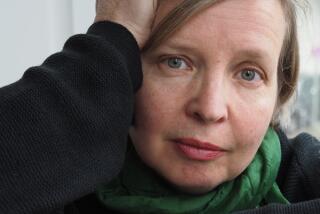The Loves of Franz Kafka by Nahum N. Glatzer (Schocken: $12.95; 112 pp.)
- Share via
Everyone’s life is some kind of love story. No one has nothing to tell. The unloved have their own kind of story, as do the unloving, for whatever else there may be in a life, there is always also this.
Nahum N. Glatzer--in this brief, poignant, beautiful book--tells us the love story that was Franz Kafka’s life. The words are largely Kafka’s own, Glatzer having assembled a kind of scrapbook from the writer’s extraordinary diaries and letters, only supplementing it with information from the biography by Kafka’s friend Max Brod. The result is a moving and, for me, a strangely happy story.
Kafka, his literary achievement aside, has seemed to most a tragic and to some a twisted figure. The reasons are notorious: the broken engagements, the obsession with “purity,” the predations of a self-loathing so extreme that the writer questioned whether he was a member of the human race. “Late in his life,” Glatzer writes, “in 1922, Kafka made the sad confession that he had never known the words ‘I love you’ but ‘only the expectant stillness that should have been broken by my “I love you”--that is all that I have known, nothing more.’ ”
But those resigned, exquisitely self-conscious words were not Kafka’s last. A year after he wrote them, already grievously ill with tuberculosis, he met Dora Dymant, the cook in a Jewish asylum. The two became lovers, took a small apartment, and informed Dora’s father, a devout Hasid from Eastern Europe, of their wish to marry. The Hasidic rabbi forbade the marriage: Kafka was not an observant Jew. But the couple continued to live together until the young writer’s death only some months later.
Kafka himself had broken off three previous engagements. Had he lived, would he eventually have broken off this one? Near the end, no longer able to speak, he wrote a note to Dora: “How many years will you be able to stand it? How long will I be able to stand your standing it?” Years ? To what did the pronoun refer? And yet, when he died, Dora sobbed, “My love, my love, my dearest!” Later, as Kafka was buried in the Jewish cemetery of Prague, she cried out again: “My love, my dearest: He is so alone, yes, so quite alone, there is nothing for us to do, oh my dear one, my sweet.”
The love story that is Franz Kafka’s life--in the main the story of an excruciating emotional imprisonment--seems in the end to be the story of an unexpected liberation. The greatest Jewish writer of this century died tragically young, just 40 years old in 1924, but if he had lived to be 60, would he have been buried in the Prague Cemetery with a train of 100 mourners following his body to the grave? Or would he, instead, have been incinerated in a Nazi camp? And is not any life happy that ends so bathed in love?
The larger portion of Glatzer’s short book deals with Kafka’s two lengthy, eventually broken engagements to Felice Bauer. Felice did not release the many impassioned letters she had received from Kafka until 1955, after the death of the man she finally married. Those letters coincide with the years when Kafka was seizing and shaping his identity as a writer. They have more to do than does the fragmentary story of his last love affair with why he is remembered so well 60 years after his death. And yet when Felice released the letters for publication, what she said to the publisher was, “ Mein Franz war ein Heiliger “: “My Franz was a saint.” What Dora called Kafka was not “saint” but “my sweet one.” In the love story, those words were--in time and by right--the closing line.
More to Read
Sign up for our Book Club newsletter
Get the latest news, events and more from the Los Angeles Times Book Club, and help us get L.A. reading and talking.
You may occasionally receive promotional content from the Los Angeles Times.










